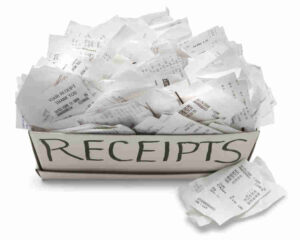Do I really need to keep all those receipts??
 Often overlooked, receipt keeping is a necessary component of good bookkeeping. Receipts are the primary and easiest way for a business to support all entries recorded on the books and on tax returns. Should the IRS audit your business’ tax return, they will require supporting documentation showing not only the amount paid but a detail of record proving that the item was, in fact, a qualified business expense.
Often overlooked, receipt keeping is a necessary component of good bookkeeping. Receipts are the primary and easiest way for a business to support all entries recorded on the books and on tax returns. Should the IRS audit your business’ tax return, they will require supporting documentation showing not only the amount paid but a detail of record proving that the item was, in fact, a qualified business expense.